theartsdesk in Kyiv - defiant new operatic epic in an empty gallery | reviews, news & interviews
theartsdesk in Kyiv - defiant new operatic epic in an empty gallery
theartsdesk in Kyiv - defiant new operatic epic in an empty gallery
Plaintive affirmation of the human and the divine in the Khanenko Museum of Art
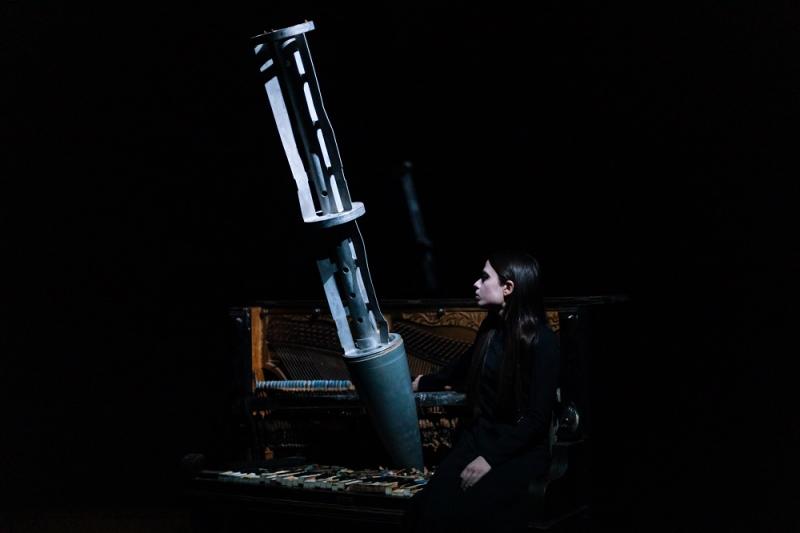
The Khanenko Museum stands opposite the Taras Shevchenko Park in central Kyiv, a popular green oasis next to the University. One of the 83 Russian missiles fired into Ukrainian cities on Monday this week landed at an intersection on the edge of the park, killing several commuters.
Paintings and other priceless objects from the museum, the country’s pre-eminent collection of art from around the world, have been moved to a safe location, leaving an empty !9th century merchant’s palace that lends itself to an immersive theatrical and musical experience (pictured below: the Khanenko Museum in its usual state). 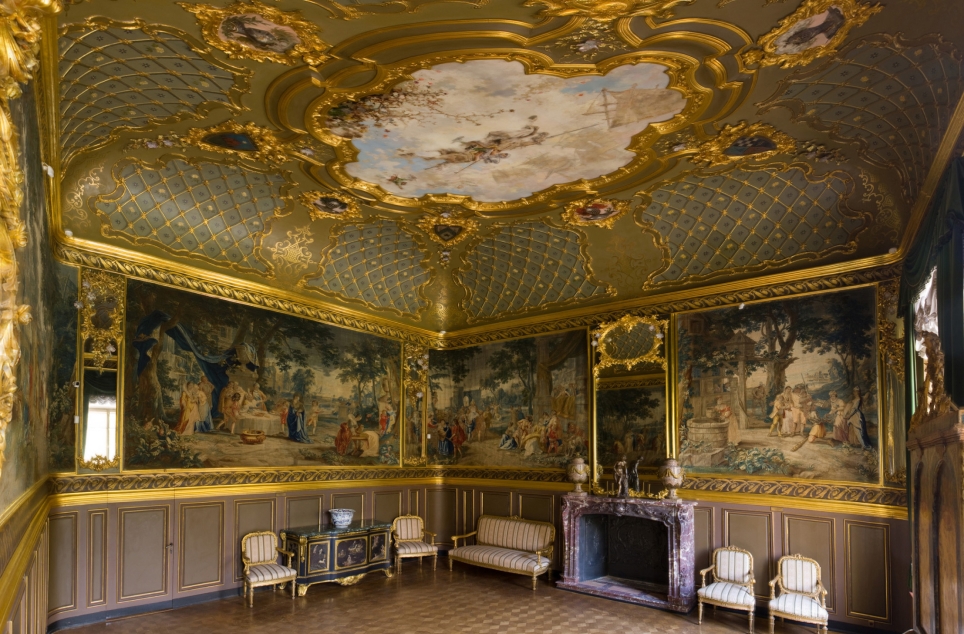 Genesis is performed over a period of five hours by Opera Aperta, a company that describes itself as a “contemporary art laboratory”. The work is divided into 13 scenes, loosely connected to the 13 rooms of the museum: audience members navigate the space at will, converging at various points for set pieces in the main gallery. “Wandering through the labyrinths of memories and soundscapes,” the programme suggests, “the viewer is empowered to create operas, slow down time and deconstruct history.”
Genesis is performed over a period of five hours by Opera Aperta, a company that describes itself as a “contemporary art laboratory”. The work is divided into 13 scenes, loosely connected to the 13 rooms of the museum: audience members navigate the space at will, converging at various points for set pieces in the main gallery. “Wandering through the labyrinths of memories and soundscapes,” the programme suggests, “the viewer is empowered to create operas, slow down time and deconstruct history.”
Grygoriv and Razumeiko, who co-founded Opera Aperta and who have collaborated on award-winning film music, are well-established in the international contemporary music scene. In 2021, the Music Theatre Now network named their “archaeological” opera Chornobyldorf one of the six best music-theatre performances of the previous three years; in 2018, their first opera, Iyov, made it to the top ten.
In the Genesis opening scene, “Lux et sonus”, the separation of light from darkness, and sound from silence is communicated in the form of Ophelia (Marichka Shtyrbulova) sitting on the keyboard of a broken piano and reaching behind her to hit the strings randomly. A large object protruding from the piano suggests an artillery shell, but the image isn’t explicit: throughout, there is an affirmation of the human impulse towards light even in adversity, but the opera is not anchored in the immediate circumstances of the Russian invasion. 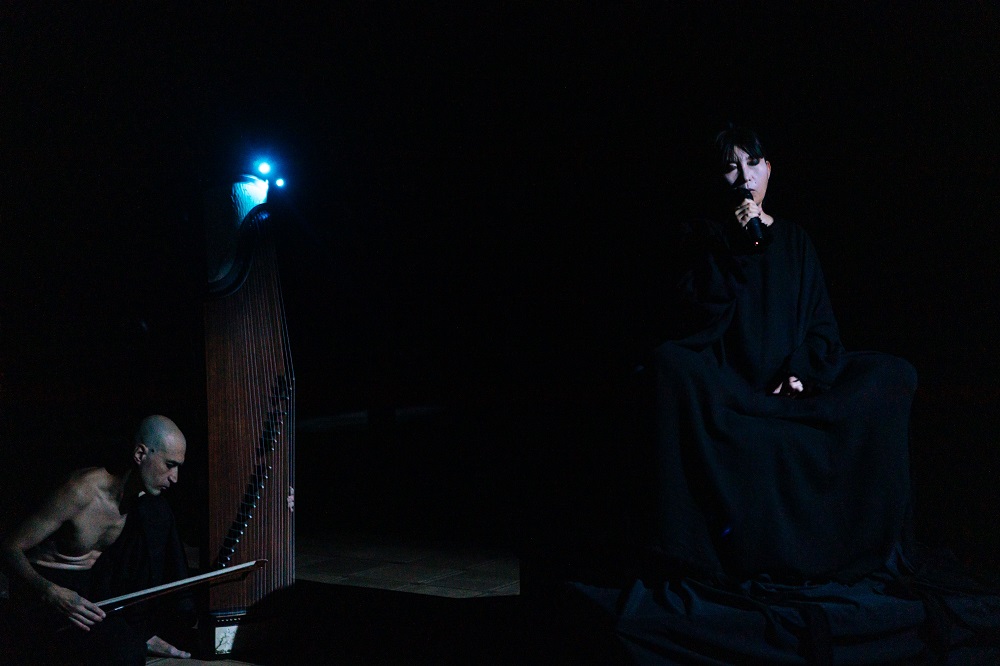 The next scene, “Vox Humana”, depicts the emergence of the human form, and with it the voice. Inanna (Nazgul Shukaeva), in flowing black robes, sits on a dais making gibberish mouth music, accompanied by a harp, that gradually coalesces into a continuous single rising note (pictured above).
The next scene, “Vox Humana”, depicts the emergence of the human form, and with it the voice. Inanna (Nazgul Shukaeva), in flowing black robes, sits on a dais making gibberish mouth music, accompanied by a harp, that gradually coalesces into a continuous single rising note (pictured above).
In the other rooms – where, for example, a man scribbles and bangs on a piece of metal, a girl plays random notes on the strings of a harp, a computer activates the keys of a piano, and a performer destroys a cello with a hacksaw – I lost the plot a little. Occasionally, too, I felt the anarchic score risked losing cohesion: dynamic and wildly varied sound (vocal and instrumental inventiveness being at a premium here) skilfully produced in an elegant mansion is undoubtedly bracing, but some of the scenes, removed from the context of the performance in the main gallery, seemed to me at times rather arbitrary.
Yet,Genesis is an intricately crafted and coherent work of art. If there are dips, there are extremely rewarding peaks. 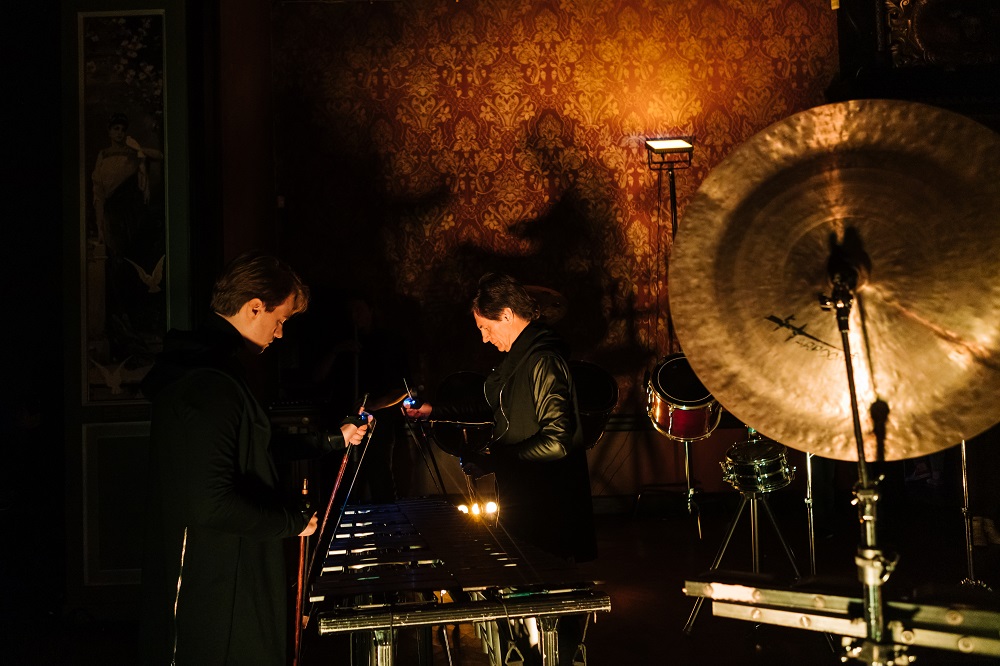 The piece comes together in an impressive sequence – “Genesis,” “Dionisia,” “Sonnenfinsternis”, “Missa pange lingua,” and “Rautela”. Members of the orchestra sit in various parts of the main gallery and the audience moves freely among them. The sequence opens with a cacophony – screeching strings and percussion (tubular bells, cowbells, an assortment of drums) brass and wind contributing random notes and phrases, and a piano adding rhythmically to the racket. Out of this chaos emerges a neo-baroque acclamation sung from a gallery above the hall by Calliope (Diana Zyabchenko), Melopomena (Yulia Alekseeviieva), and Euterpha (Natalia Chepchenko). The contrast between the chaos below and the transcendent music above, which quickly asserts itself, is striking and effective.
The piece comes together in an impressive sequence – “Genesis,” “Dionisia,” “Sonnenfinsternis”, “Missa pange lingua,” and “Rautela”. Members of the orchestra sit in various parts of the main gallery and the audience moves freely among them. The sequence opens with a cacophony – screeching strings and percussion (tubular bells, cowbells, an assortment of drums) brass and wind contributing random notes and phrases, and a piano adding rhythmically to the racket. Out of this chaos emerges a neo-baroque acclamation sung from a gallery above the hall by Calliope (Diana Zyabchenko), Melopomena (Yulia Alekseeviieva), and Euterpha (Natalia Chepchenko). The contrast between the chaos below and the transcendent music above, which quickly asserts itself, is striking and effective.
In the next scene, Euridice (Kateryna Hordienko) enters the room accompanied by three musicians and responds to the instruments in an overtly sensual (and disturbing) way before joining Orfeo (Khystina Slobodianiuk) in a tableau, where they face each other on either side of a bass drum as the music moves organically from an atonal cacophony to two minor chords rising in a crescendo to a tumultuous climax. 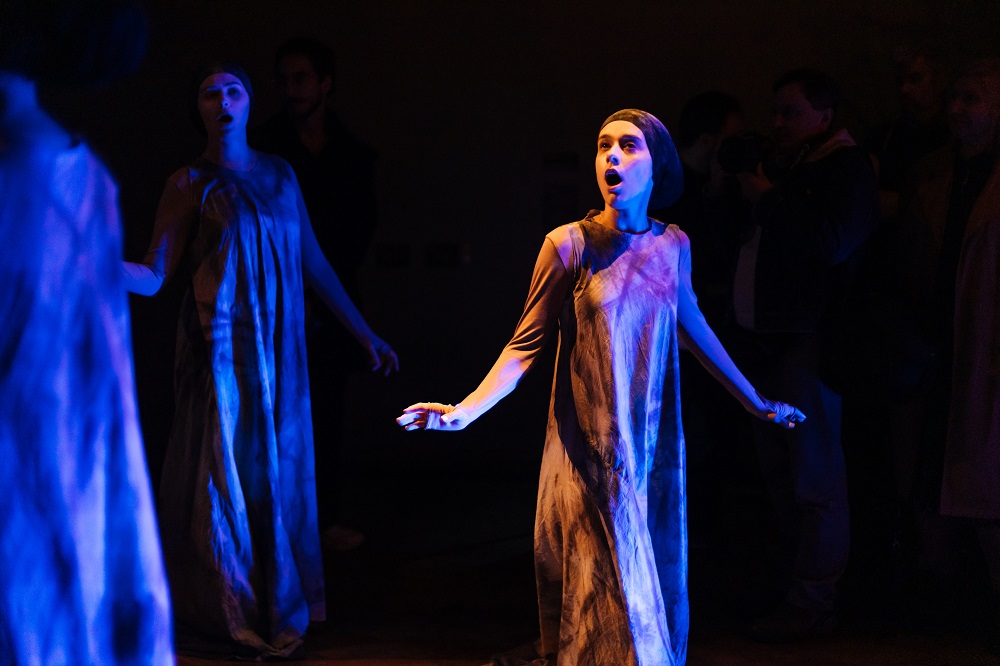 For the remainder of the opera, dancers are in various states of undress, which has the effect of accentuating the profoundly corporeal (as opposed to mythical) nature of the idea being presented (the programme makes specific reference to the depiction of Adam and Eve by the Renaissance artist and friend of Martin Luther, Lucas Cranach).
For the remainder of the opera, dancers are in various states of undress, which has the effect of accentuating the profoundly corporeal (as opposed to mythical) nature of the idea being presented (the programme makes specific reference to the depiction of Adam and Eve by the Renaissance artist and friend of Martin Luther, Lucas Cranach).
The scene with the drum leads into a stunning performance of a Slav folk melody by Marichka Shtyrbulova (pictured above), with a ululating close harmony from singers in the orchestra. It is worth travelling to Kyiv, I think, to witness this – the emergence of a plaintive affirmation of the human and the divine is all the more resonant because of the discord (and quasi pornographic choreography) that precedes it.
In an anteroom, Eve has been lying naked on a bed of gold (pictured below). She rises and moves into the gallery. Her long tresses fashioned out of HDMI cables. A raucously percussive piano is in the ascendant as she makes a slow and electrifying progress through the audience before the “Missa pange lingua” section reverts to a harmonic crescendo. 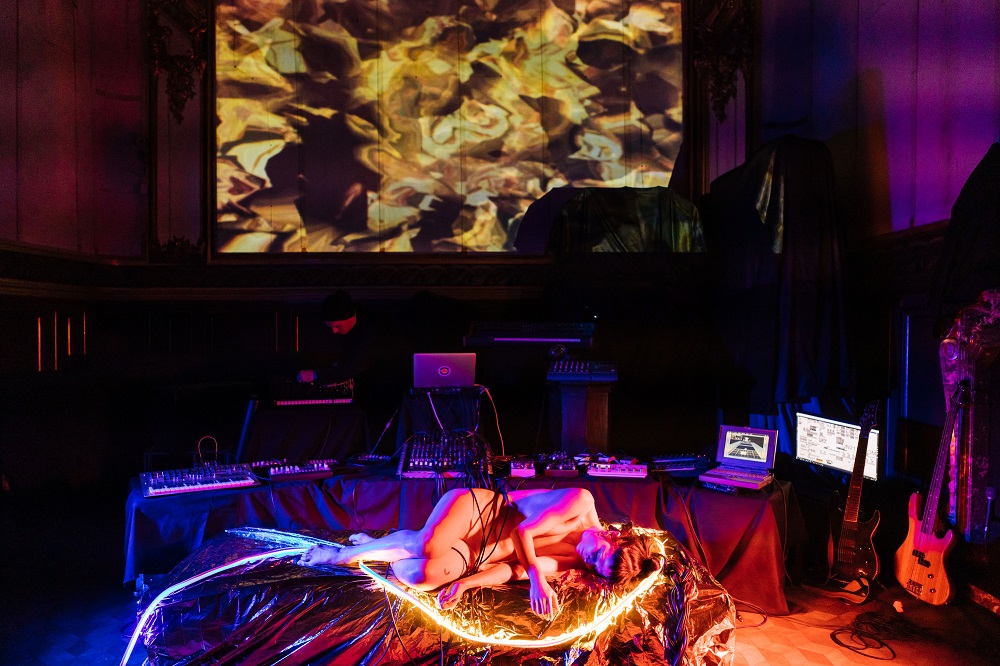 In the Missa segment, audience and cast members hold hands in a circle as singers intone a heartfelt and very moving Kyrie eleison. The opera champions creation rather than destruction and isn’t closely bound to current circumstances, yet I found this appeal to divine compassion to be eloquent and courageous in a time of conflict.
In the Missa segment, audience and cast members hold hands in a circle as singers intone a heartfelt and very moving Kyrie eleison. The opera champions creation rather than destruction and isn’t closely bound to current circumstances, yet I found this appeal to divine compassion to be eloquent and courageous in a time of conflict.
The final scene during the 1 October performance was interrupted by an air-raid alert, which prompted everyone to leave the building with impressive order and calm, so – in a manner of speaking – the war did become part of the production. When the all-clear was given after half an hour, the performance continued where it had been interrupted and the coherence of the piece was restored with remarkable speed The concluding scene in which the Muses, daughters of the goddess of memory Mnemosyne, play games on the seventh day of creation, was presented with characteristic energy and confidence.
Choreographer Khristina Slobodyanyuk has succeeded in representing an overarching idea in a manner that exploits the compartmentalised space of the thirteen rooms and at the same time expresses clear ideas, sometimes very powerfully, not simply as an accompaniment to the music but as a fundamental and necessary part of the performance. 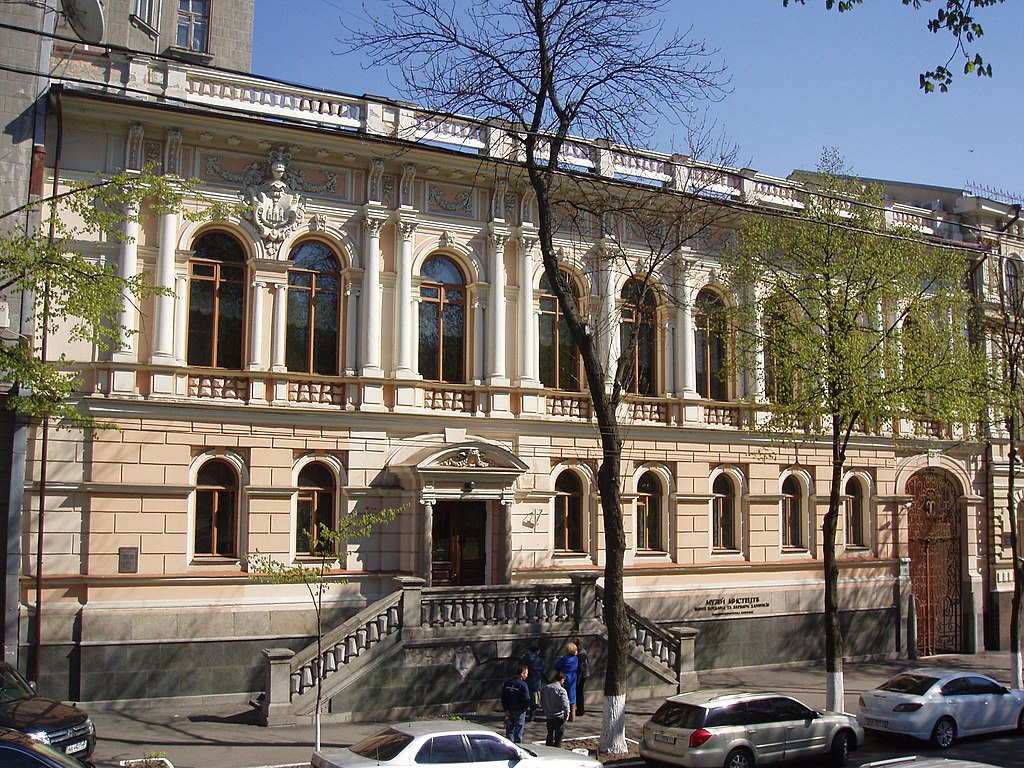
The future of Arts Journalism
You can stop theartsdesk.com closing!
We urgently need financing to survive. Our fundraising drive has thus far raised £49,000 but we need to reach £100,000 or we will be forced to close. Please contribute here: https://gofund.me/c3f6033d
And if you can forward this information to anyone who might assist, we’d be grateful.

Subscribe to theartsdesk.com
Thank you for continuing to read our work on theartsdesk.com. For unlimited access to every article in its entirety, including our archive of more than 15,000 pieces, we're asking for £5 per month or £40 per year. We feel it's a very good deal, and hope you do too.
To take a subscription now simply click here.
And if you're looking for that extra gift for a friend or family member, why not treat them to a theartsdesk.com gift subscription?
more Opera
 Albert Herring, English National Opera review - a great comedy with depths fully realised
Britten’s delight was never made for the Coliseum, but it works on its first outing there
Albert Herring, English National Opera review - a great comedy with depths fully realised
Britten’s delight was never made for the Coliseum, but it works on its first outing there
 Carmen, English National Opera review - not quite dangerous
Hopes for Niamh O’Sullivan only partly fulfilled, though much good singing throughout
Carmen, English National Opera review - not quite dangerous
Hopes for Niamh O’Sullivan only partly fulfilled, though much good singing throughout
 Giustino, Linbury Theatre review - a stylish account of a slight opera
Gods, mortals and monsters do battle in Handel's charming drama
Giustino, Linbury Theatre review - a stylish account of a slight opera
Gods, mortals and monsters do battle in Handel's charming drama
 Susanna, Opera North review - hybrid staging of a Handel oratorio
Dance and signing complement outstanding singing in a story of virtue rewarded
Susanna, Opera North review - hybrid staging of a Handel oratorio
Dance and signing complement outstanding singing in a story of virtue rewarded
 Ariodante, Opéra Garnier, Paris review - a blast of Baroque beauty
A near-perfect night at the opera
Ariodante, Opéra Garnier, Paris review - a blast of Baroque beauty
A near-perfect night at the opera
 Cinderella/La Cenerentola, English National Opera review - the truth behind the tinsel
Appealing performances cut through hyperactive stagecraft
Cinderella/La Cenerentola, English National Opera review - the truth behind the tinsel
Appealing performances cut through hyperactive stagecraft
 Tosca, Royal Opera review - Ailyn Pérez steps in as the most vivid of divas
Jakub Hrůša’s multicoloured Puccini last night found a soprano to match
Tosca, Royal Opera review - Ailyn Pérez steps in as the most vivid of divas
Jakub Hrůša’s multicoloured Puccini last night found a soprano to match
 Tosca, Welsh National Opera review - a great company reduced to brilliance
The old warhorse made special by the basics
Tosca, Welsh National Opera review - a great company reduced to brilliance
The old warhorse made special by the basics
 BBC Proms: The Marriage of Figaro, Glyndebourne Festival review - merriment and menace
Strong Proms transfer for a robust and affecting show
BBC Proms: The Marriage of Figaro, Glyndebourne Festival review - merriment and menace
Strong Proms transfer for a robust and affecting show
 BBC Proms: Suor Angelica, LSO, Pappano review - earthly passion, heavenly grief
A Sister to remember blesses Puccini's convent tragedy
BBC Proms: Suor Angelica, LSO, Pappano review - earthly passion, heavenly grief
A Sister to remember blesses Puccini's convent tragedy
 Orpheus and Eurydice, Opera Queensland/SCO, Edinburgh International Festival 2025 review - dazzling, but distracting
Eye-popping acrobatics don’t always assist in Gluck’s quest for operatic truth
Orpheus and Eurydice, Opera Queensland/SCO, Edinburgh International Festival 2025 review - dazzling, but distracting
Eye-popping acrobatics don’t always assist in Gluck’s quest for operatic truth
 MARS, Irish National Opera review - silly space oddity with fun stretches
Cast, orchestra and production give Jennifer Walshe’s bold collage their all
MARS, Irish National Opera review - silly space oddity with fun stretches
Cast, orchestra and production give Jennifer Walshe’s bold collage their all

Add comment